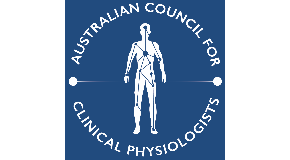ANZ Clinical Physiology Education Hub Day 2025
About
The morning opening plenary will explore the physiological impacts of obesity and hypoxia, with engaging, multidisciplinary presentations from leading experts.
Discipline specific breakout sessions will deliver practical, profession-specific content across clinical physiology disciplines.
The closing plenary session will cover recent highlights across Cardio, Neurology, Respiratory and Sleep.
You'll also enjoy great networking opportunities and exceptional catering in this iconic venue.
NOTE: For Cardiac Discipline Sessions (Introduction to Electrocardiography) - please select both cardiac sessions in order to be eligible for certificate.
Tickets are strictly limited - Don't Miss Out!
REGISTRATION CLOSING DATE: Fri 18th July
Location
State Library of Victoria
328 Swanston Street, Melbourne VIC 3000
PRELIMINARY PROGRAM
OPENING PLENARY
From breath to brain: physiological consequences of obesity & hypoxia
Brigitte Borg Respiratory: Obesity & Pulmonary Function
Miriam Norman Cardiac: Obesity & the Heart
Brad Edwards Sleep: Obesity & Sleep Physiology
Luke Slingsby Neuro: Responses to Hypoxia
SESSIONS 2 AND 2 Discipline-Specific Concurrent Sessions
• These sessions are aimed at scientists and clinical physiologists, including early career professionals and those wanting a refresher on the basics. Some sessions also cover more advanced topics that may be useful for registration exams, as noted below.
• Delegates are welcome to attend sessions from other disciplines if they wish.
SESSION 2 – 11:00 AM to 12:30 PM
Cardiac Stream - An Introduction to Electrocardiography (Part 1 of 2)
🫀 Professionals in Cardiac Sciences Australia (PiCSA) presents an Introduction to Electrocardiography—a practical, hands-on course delivered over two 90-minute sessions. Ideal for beginners or those needing a refresher, the course covers accurate lead placement, step-by-step interpretation, and common arrhythmias.
Developed by Realityworks and supported by Australian distributor Virtual Know-How, the course features simulation tools, interactive content, and expert instruction. Includes pre- and post-course assessments and a certificate of completion. Places are limited.
NOTE (AS ABOVE): For Cardiac Discipline Sessions (Introduction to Electrocardiocraphy) - please select both cardiac sessions in order to be eligible for certificate.
Neurophysiology Stream - Epilepsy to Stroke: Neurophysiology in Focus
Managing Epilepsy with Ketogenic Diet – Chris Farrell
Neurophysiology for Prognostication in Cardiac Arrest and Stroke – Luke Slingsby
Obesity and Peripheral Neuropathy
Obesity and effects on neurophysiology in surgery - Tom Verhellen
Respiratory Stream - Physiology Principles
For respiratory scientists preparing for CRFS exam, early career physiologists, and those seeking a refresher in foundational principles.
Pulmonary Pharmacology - Kate Hardaker Dusanovski
Basic mechanisms, common respiratory drugs, interpreting bronchodilator responses
Diagnostic Procedures in Respiratory Physiology - Lauren Bussell
Bronchial challenge testing, hyper/hypoventilation, shunt studies
Lung Volumes and Ventilation Distribution - Cassidy De Berry
Body plethysmography vs gas dilution, LCI/MBW concepts
Interpretation Essentials - Kristin Southwell
Pattern recognition, artefact troubleshooting, applying guidelines
Concludes with Q&A and panel discussion
Sleep Stream - Sleep Science Masterclass
Polysomnography Masterclass. What’s normal, what’s not, and how to interpret it all. For sleep scientists preparing for CSS exam, early career physiologists, and those seeking a refresher.
Normal and Disordered Sleep – Dr. Kerri Melehan
Explore key phenomena seen in PSG, including Cheyne-Stokes respiration, phase disorders, catathrenia, PLMD, and selected cardiac rhythms - what’s normal, what’s not, and when to act.
Performing Studies – Brett Duce
A practical look at PSG setup and signal interpretation topics: including amplifier types, A/D conversion, practical explanation of filters, biocalibration, oximetry, 10-20 accuracy, and EOG features.
Study Analysis – Tom Churchward
Sharpen your sleep staging skills with a focus on sleep stage transitions, effects of hypnotics on EEG, transient phenomena, and nuanced application of scoring rules.
Paediatrics – Nicole Verginis
Key differences in paediatric sleep: including AHI thresholds for childhood OSA, developmental milestones in sleep spindles, and how hypnograms evolve with age.
Concludes with Q&A and panel discussion
SESSION 3 – 1:30 PM to 3:00 PM
Cardiac Stream - An Introduction to Electrocardiography (Part 2 of 2)
Hands-on ECG course. Continued from Session 2. See above for course details.
Neurophysiology Stream - Neurophysiology in Obesity
Obesity and Peripheral Neuropathy – Luke Slingsby
Obesity and Effects on Neurophysiology in Surgery - Tom Verhellen
Respiratory Stream - Pulmonary Function Testing in Neuromuscular Disease
Case study of a patient experience with multidisciplinary care
Respiratory Function Testing in NMD – Emma Smith
Overview of key tests (MIP/MEP, SNIP, PCF etc.), equipment and protocol variations: real world challenges, experience, and tips.
How Physiologic Testing Impacts Discussions, Decisions, and Prognosis – Dr Anna Ridgers
Role of RFTs, PSG in initiation of NIV. Influence on decisions about PEG. Management strategies, ongoing monitoring, and forecasting disease trajectory.
Concludes with Q&A and panel discussion
Sleep Stream - Sleep and Vigilance Insights
Sleep EEG Insights into Neurological Function – A/Prof Anna Mullins
Explore EEG changes, slow-wave oscillations, memory, and CPAP comparisons.
Where to Draw the Line? Sleep Latency and Vigilance Testing – Dr Denise O'Driscoll
Discuss MSLT/MWT interpretation challenges: frequent arousals, unconsolidated sleep, and test reliability. A practical and provocative session.
CLOSING PLENARY
Recent Highlights from Cardiac, Neurology, Respiratory & Sleep




